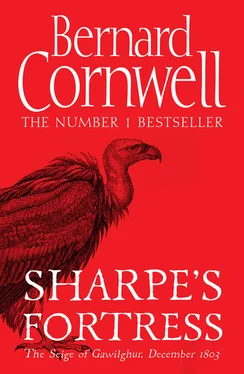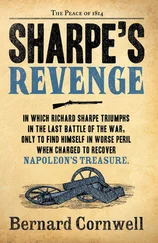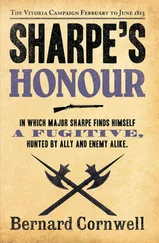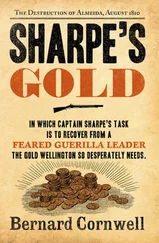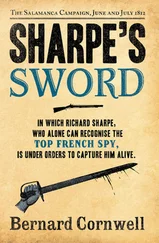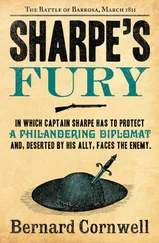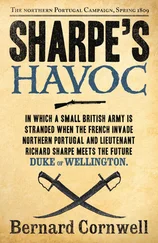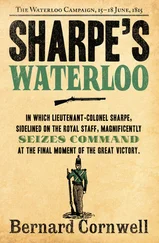Bernard Cornwell - Sharpe’s Fortress - The Siege of Gawilghur, December 1803
Здесь есть возможность читать онлайн «Bernard Cornwell - Sharpe’s Fortress - The Siege of Gawilghur, December 1803» — ознакомительный отрывок электронной книги совершенно бесплатно, а после прочтения отрывка купить полную версию. В некоторых случаях можно слушать аудио, скачать через торрент в формате fb2 и присутствует краткое содержание. Жанр: unrecognised, на английском языке. Описание произведения, (предисловие) а так же отзывы посетителей доступны на портале библиотеки ЛибКат.
- Название:Sharpe’s Fortress: The Siege of Gawilghur, December 1803
- Автор:
- Жанр:
- Год:неизвестен
- ISBN:нет данных
- Рейтинг книги:3 / 5. Голосов: 1
-
Избранное:Добавить в избранное
- Отзывы:
-
Ваша оценка:
- 60
- 1
- 2
- 3
- 4
- 5
Sharpe’s Fortress: The Siege of Gawilghur, December 1803: краткое содержание, описание и аннотация
Предлагаем к чтению аннотацию, описание, краткое содержание или предисловие (зависит от того, что написал сам автор книги «Sharpe’s Fortress: The Siege of Gawilghur, December 1803»). Если вы не нашли необходимую информацию о книге — напишите в комментариях, мы постараемся отыскать её.
Sharpe’s Fortress: The Siege of Gawilghur, December 1803 — читать онлайн ознакомительный отрывок
Ниже представлен текст книги, разбитый по страницам. Система сохранения места последней прочитанной страницы, позволяет с удобством читать онлайн бесплатно книгу «Sharpe’s Fortress: The Siege of Gawilghur, December 1803», без необходимости каждый раз заново искать на чём Вы остановились. Поставьте закладку, и сможете в любой момент перейти на страницу, на которой закончили чтение.
Интервал:
Закладка:
Dodd trailed the square. He heard cavalry trumpets and he twisted in his saddle to see a mass of irregular light horsemen come over the crest. ‘Halt!’ he shouted. ‘Close ranks! Charge bayonets!’
The white-jacketed Cobras sealed the loose square tight. Dodd pushed through the face of the square and turned his horse to watch the cavalrymen approach. He doubted they would come close, not when there were easier pickings to the east and, sure enough, as soon as the leading horsemen saw that the square was waiting with levelled muskets, they sheered away.
Dodd holstered his pistol. ‘March on, Jemadar!’
Twice more Dodd had to halt and form ranks, but both times the threatening horsemen were scared away by the calm discipline of his white-coated soldiers. The red-coated infantry was not pursuing. They had reached the village of Argaum and were content to stay there, leaving the pursuit to the horsemen, and those horsemen chased after the broken rabble that flooded northwards, but none chose to die by charging Dodd’s formed ranks.
Dodd inclined to the west, angling away from the pursuers. By nightfall he was confident enough to form the battalion into a column of companies, and by midnight, under a clear moon, he could no longer even hear the British trumpets. He knew that men would still be dying, ridden down by cavalry and pierced by lances or slashed by sabres, but Dodd had got clean away. His men were tired, but they were safe in a dark countryside of millet fields, drought-emptied irrigation ditches and scattered villages where dogs barked frantically when they caught the scent of the marching column.
Dodd did not trouble the villagers. He had sufficient food, and earlier in the night they had found an irrigation tank that had yielded enough water for men and beasts. ‘Do you know where we are, Jemadar?’ he asked.
‘No, sahib.’ Gopal grinned, his teeth showing white in the darkness.
‘Nor do I. But I know where we’re going.’
‘Where, sahib?’
‘To Gawilghur, Gopal. To Gawilghur.’
‘Then we must march north, sahib.’ Gopal pointed to the mountains that showed as a dark line against the northern stars. ‘It is there, sahib.’
Dodd was marching to the fortress that had never known defeat. To the impregnable fastness on the cliff. To Gawilghur.
Dawn came to the millet fields. Ragged-winged birds flopped down beside corpses. The smell of death was already rank, and would only grow worse as the sun rose to become a furnace in a cloudless sky. Bugles called reveille, and the picquets who had guarded the sleeping army around Argaum cleared their muskets by loosing off shots. The gunfire startled birds up from corpses and made the feasting dogs growl among the human dead.
Regiments dug graves for their own dead. There were few enough to bury, for no more than fifty redcoats had died, but there were hundreds of Mahratta and Arab corpses, and the lascars who did the army’s fetching and carrying began the task of gathering the bodies. Some enemies still lived, though barely, and the luckiest of those were despatched with a blow of a mattock before their robes were rifled. The unlucky were taken to the surgeons’ tents.
The enemy’s captured guns were inspected, and a dozen selected as suitable for British service. They were all well made, forged in Agra by French-trained gunsmiths, but some were the wrong calibre and a few were so overdecorated with writhing gods and goddesses that no self-respecting gunner could abide them. The twenty-six rejected guns would be double-shotted and exploded. ‘A dangerous business,’ Lieutenant Colonel William Wallace remarked to Sharpe.
‘Indeed, sir.’
‘You saw the accident at Assaye?’ Wallace asked. The Colonel took off his cocked hat and fanned his face. The hat’s white plumes were still stained with blood that had dried black.
‘I heard it, sir. Didn’t see it,’ Sharpe said. The accident had occurred after the battle of Assaye when the enemy’s captured cannon were being destroyed and one monstrous piece, a great siege gun, had exploded prematurely, killing two engineers.
‘Leaves us short of good engineers,’ Wallace remarked, ‘and we’ll need them if we’re going to Gawilghur.’
‘Gawilghur, sir?’
‘A ghastly fortress, Sharpe, quite ghastly.’ The Colonel turned and pointed north. ‘Only about twenty miles away, and if the Mahrattas have any sense that’s where they’ll be heading.’ Wallace sighed. ‘I’ve never seen the place, so maybe it isn’t as bad as they say, but I remember poor McCandless describing it as a brute. A real brute. Like Stirling Castle, he said, only much larger and the cliff’s twenty times higher.’
Sharpe had never seen Stirling Castle, so had no real idea what the Colonel meant. He said nothing. He had been idling the morning away when Wallace sent for him, and now he and the Colonel were walking through the battle’s litter. The Arab boy followed a dozen paces behind. ‘Yours, is he?’ Wallace asked.
‘Think so, sir. Sort of picked him up yesterday.’
‘You need a servant, don’t you? Urquhart tells me you don’t have one.’
So Urquhart had been discussing Sharpe with the Colonel. No good could come of that, Sharpe thought. Urquhart had been nagging Sharpe to find a servant, implying that Sharpe’s clothes were in need of cleaning and pressing, which they were, but as he only owned the clothes he wore, he could not really see the point in being too finicky. ‘I hadn’t really thought what to do with the lad, sir,’ Sharpe admitted.
Wallace turned and spoke to the boy in an Indian language, and Ahmed stared up at the Colonel and nodded solemnly as though he understood what had been said. Perhaps he did, though Sharpe did not. ‘I’ve told him he’s to serve you properly,’ Wallace said, ‘and that you’ll pay him properly.’ The Colonel seemed to disapprove of Ahmed, or maybe he just disapproved of everything to do with Sharpe, though he was doing his best to be friendly. It had been Wallace who had given Sharpe the commission in the 74th, and Wallace had been a close friend of Colonel McCandless, so Sharpe supposed that the balding Colonel was, in his way, an ally. Even so, Sharpe felt awkward in the Scotsman’s company. He wondered if he would ever feel relaxed among officers. ‘How’s that woman of yours, Sharpe?’ Wallace asked cheerfully.
‘My woman, sir?’ Sharpe asked, blushing.
‘The Frenchwoman, can’t recall her name. Took quite a shine to you, didn’t she?’
‘Simone, sir? She’s in Seringapatam, sir. Seemed the best place for her, sir.’
‘Quite, quite.’
Simone Joubert had been widowed at Assaye where her husband, who had served Scindia, had died. She had been Sharpe’s lover and, after the battle, she had stayed with him. Where else, she asked, was she to go? But Wellesley had forbidden his officers to take their wives on the campaign, and though Simone was not Sharpe’s wife, she was white, and so she had agreed to go to Seringapatam and there wait for him. She had carried a letter of introduction to Major Stokes, Sharpe’s friend who ran the armoury, and Sharpe had given her some of the Tippoo’s jewels so that she could find servants and live comfortably. He sometimes worried he had given her too many of the precious stones, but consoled himself that Simone would keep the surplus safe till he returned.
‘So are you happy, Sharpe?’ Wallace asked bluffly.
‘Yes, sir,’ Sharpe said bleakly.
‘Keeping busy?’
‘Not really, sir.’
‘Difficult, isn’t it?’ Wallace said vaguely. He had stopped to watch the gunners loading one of the captured cannon, a great brute that looked to take a ball of twenty or more pounds. The barrel had been cast with an intricate pattern of lotus flowers and dancing girls, then painted with garish colours. The gunners had charged the gaudy barrel with a double load of powder and now they rammed two cannonballs down the blackened gullet. An engineer had brought some wedges and a gunner sergeant pushed one down the barrel, then hammered it home with the rammer so that the ball would jam when the gun was fired. The engineer took a ball of fuse from his pocket, pushed one end into the touch-hole, then backed away, uncoiling the pale line. ‘Best if we give them some space,’ Wallace said, gesturing that they should walk south a small way. ‘Don’t want to be beheaded by a scrap of gun, eh?’
Читать дальшеИнтервал:
Закладка:
Похожие книги на «Sharpe’s Fortress: The Siege of Gawilghur, December 1803»
Представляем Вашему вниманию похожие книги на «Sharpe’s Fortress: The Siege of Gawilghur, December 1803» списком для выбора. Мы отобрали схожую по названию и смыслу литературу в надежде предоставить читателям больше вариантов отыскать новые, интересные, ещё непрочитанные произведения.
Обсуждение, отзывы о книге «Sharpe’s Fortress: The Siege of Gawilghur, December 1803» и просто собственные мнения читателей. Оставьте ваши комментарии, напишите, что Вы думаете о произведении, его смысле или главных героях. Укажите что конкретно понравилось, а что нет, и почему Вы так считаете.
